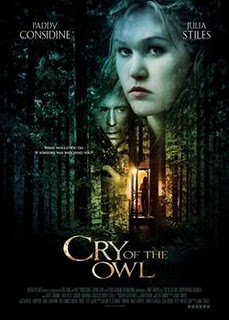
THE CRY OF THE OWL
UK/Canada, 2009, 100 minutes, Colour.
Paddy Considine, Julia Stiles, James Gilbert.
Directed by Jamie Thraves.
The Cry of the Owl is based on a novel by Patricia Highsmith, best known for her Ripley novels and Strangers on a Train. Claude Chabrol had made a film of this novel in 1987, with a French setting.
The film focuses on a design scientist who has undergone a divorce, is depressed, watches a woman in her house and is accused of stalking. The woman herself, played by Julia Stiles, is enigmatic and strikes up a rapport with the designer. Her boyfriend creates trouble – and is linked with the designer’s ex-wife.
The film is a drama, focusing on the mental and emotional states of the two central characters. It then becomes something of a murder mystery with a fight between the designer and the ex-boyfriend, his disappearance. However, there are some twists in the plot before the end, quite unexpected.
1. A psychological thriller? The work of Patricia Highsmith?
2. The settings, the countryside and house, the woods and the river, the small town? The contrast with the large plant, the offices, the design? Scenes in the city, lawyers’ offices, apartments? The different worlds? Musical score?
3. The title, the owl as the harbinger of death? Jenny and her stories about owls, fate? Greg and Nikki as harbingers of death? Robert as the harbinger of Jenny’s death?
4. The atmosphere, realistic, the workplace, the divorce? Surreal in the woods, the house, the conversations between Robert and Jenny, their intensity, the developing relationship, his resistance? The stylised aspects, the fights, deaths, investigations, the plot against Robert? The ending?
5. The introduction to Robert, driving, watching Jenny outside the house, the house itself, the kitchen, ordinary? Jenny’s relationship with Greg? The contrast with Robert’s workplace, his friend, the boss? The story of his breakdown, medication, the story about the knife and his wife? The divorce proceedings, his wife’s joke at the table? The pressure on him?
6. Audience change of perspective on Robert, his seemingly being odd, stalking, return to the house, his protest to Jenny, invited in, the discussions about fate and death, the owl, destiny? His being stalked by Jenny, his growing anxiety? The freedom from the divorce? The party, the irony of his being introduced to the nurse and her later treating him? His worry, the friendly neighbour, the hostile landlord? Jenny and her always being present, Nikki and her calls, during the night? Greg and his hostility, the fight, Robert dragging him out of the river? The police, suspicions, Greg’s father and his violence? Robert being suspended, no prospect of promotion? His friend abandoning him? The police, the interrogations, not finding a body? The kind neighbour, the talk, taking him in? The sadness of Greg killing him? The shooting, police protection? Greg and his being at the house, the police taking Robert by mistake? Robert as desperate?
7. Jenny, eccentric, pleasant, sensible, her work, relationship with Greg, inviting Robert in, conversations, her turning up, the meals, the restaurant, the phone calls, visits, staying the night, the intimacy? Robert and his wariness? Her being determined, Greg and his attack on her? The confrontation, meeting Nikki? The fight and the anger? Robert and his situation, her interpretation, fatalistic, leaving the note, killing herself?
8. The plot against Robert, the wrong body being found in the river, Greg and Nikki and their conspiracy, the shooting, Nikki and her pleading with Robert, Greg and the knife, wounding Nikki?
9. The detectives, their personalities, their role?
10. The finale, Robert and his comment about looking in the mirror and not recognising himself? The final look, the distorted mirror, his fear, framed in the mirror? The ending?